人教新目标版七年级上英语Unit 5 Do you have a soccer ball课件3
人教新目标英语七年级上册Unit 5 do you have a soccer ball(含答案)
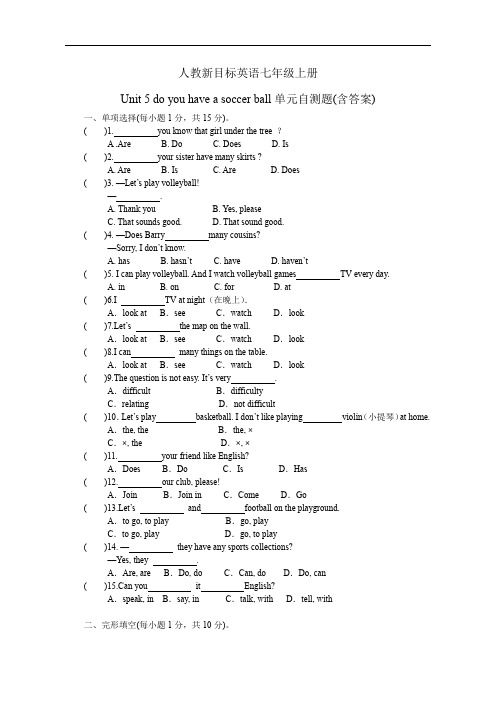
人教新目标英语七年级上册Unit 5 do you have a soccer ball单元自测题(含答案)一、单项选择(每小题1分,共15分)。
( )1. you know that girl under the tree ?A .Are B. Do C. Does D. Is( )2. your sister have many skirts ?A. AreB. IsC. AreD. Does( )3. —Let’s play volleyball!— .A. Thank youB. Yes, pleaseC. That sounds good.D. That sound good.( )4. —Does Barry many cousins?—Sorry, I don’t know.A. hasB. hasn’tC. haveD. haven’t( )5. I can play volleyball. And I watch volleyball games TV every day.A. inB. onC. forD. at( )6.I TV at night(在晚上).A.look at B.see C.watch D.look( )7.Let’s the map on the wall.A.look at B.see C.watch D.look( )8.I can many things on the table.A.look at B.see C.watch D.look( )9.The question is not easy. It’s very .A.difficult B.difficultyC.relating D.not difficult( )10.Let’s play basketball. I don’t like playing violin(小提琴)at home.A.the, the B.the, ×C.×, the D.×, ×( )11. your friend like English?A.Does B.Do C.Is D.Has( )12. our club, please!A.Join B.Join in C.Come D.Go( )13.Let’s and football on the playground.A.to go, to play B.go, playC.to go, play D.go, to play( )14. — they have any sports collections?—Yes, they .A.Are, are B.Do, do C.Can, do D.Do, can( )15.Can you it English?A.speak, in B.say, in C.talk, with D.tell, with二、完形填空(每小题1分,共10分)。
新目标英语七年级上unit_5_Do_you_have_a_soccer_ball(全课件)
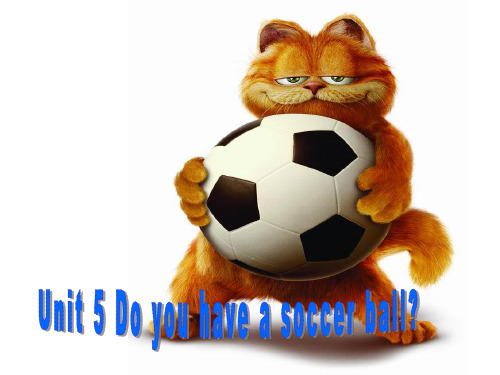
1
4
2
5
3
6
Let’s play sports! Do you play tennis? Do you play volleyball? We have many sports clubs: basketball, ping-pong, soccer, and more!
1) play sports
B: That sounds good.
A: Let’s(让咱们) play volleyball. B: I don’t have a volleyball. A: Well, let’s play soccer. B: That sounds good/interesting/fun…
Do you have a basketball?
Does he have a/an…? Yes, he does. No, he doesn’t.
Does she have a …? Yes, she does. No, she doesn’t .
Does he have a …? Yes, he does.
No, he doesn’t.
Let’s play soccer. I don’t have a soccer ball. Let’s play … That sounds good.
Let’s play basketball.
Let’s play ping-pong. Let’s play tennis.
Let’s play baseball.
A: Let’s play basketball. (let’s=let us) B: I don’t have a basketball. A: Well, let’s play ping-pong.
七年级英语上册Unit5Doyouhaveasoccerball教案新版人教新目标版
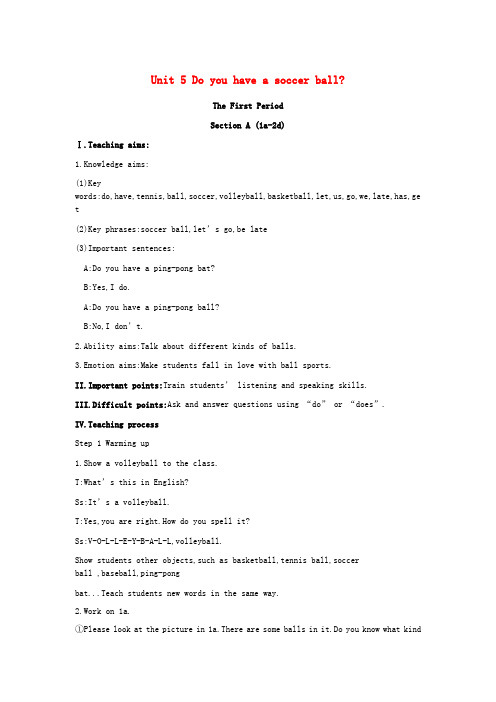
Unit 5 Do you have a soccer ball?The First PeriodSection A (1a-2d)Ⅰ.Teaching aims:1.Knowledge aims:(1)Keywords:do,have,tennis,ball,soccer,volleyball,basketball,let,us,go,we,late,has,ge t(2)Key phrases:soccer ball,let’s go,be late(3)Important sentences:A:Do you have a ping-pong bat?B:Yes,I do.A:Do you have a ping-pong ball?B:No,I don’t.2.Ability aims:Talk about different kinds of balls.3.Emotion aims:Make students fall in love with ball sports.II.Important points:Train students’ listening and speaking skills.III.Difficult points:Ask and answer questions using “do” or “does”.IV.Teaching processStep 1 Warming up1.Show a volleyball to the class.T:What’s this in English?Ss:It’s a volleyball.T:Yes,you are right.How do you spell it?Ss:V-O-L-L-E-Y-B-A-L-L,volleyball.Show students other objects,such as basketball,tennis ball,soccerball ,baseball,ping-pongbat...Teach students new words in the same way.2.Work on 1a.①Please look at the picture in 1a.There are some balls in it.Do you know what kindof balls theyare?Match the words with the things in the picture.②Teacher checks the answers.③Look at the key structure.—Do you have a ping-pong bat?—Yes,I do.—Do you have a ping-pong ball?—No,I don’t.Read the words and dialogue after the teacher and then read it together.Step 2 ListeningWork on 1b,2a,2b.1.Play the recording for the first time.Students only listen.2.Play the recording again and ask students to do 1b,2a,2b.3.Check the answers in 1b,2a,2b.Step 3 PairworkWork on 1c.Practice the conversation with your partner. Then ask and answer questions about the things in 1a.A: Do you have a ping-pong bat?B: Yes,I do.A: Do you have a ping-pong ball?B: No,I don’t.Work on 2c.Ask and answer questions about the people in 2a.A:Does Jane have a tennis ball?B:No,she doesn’t.Ask some pairs to act out their conversation.Step 4 Role-playWork on 2d.Let students read the conversation after the teacher,and then practice the conversation with theirpartners.Teacher asks some pairs to act out the conversation in front of the class.Language points1.have的用法(1)have为实义动词,意为“有”,常用句型为sb. have/has +sth.,表示“某人有某物”,当主语为第三人称单数时,have用其单三形式has。
新目标英语七年级上册_unit_5_Do_you_have_a_soccer_ball B

let sb. do sth让某人做某事
Grammar Focus:
Do you have a baseball?
Yes, I do./ No, I don't. I have a volleyball.
Do you have a ping-pong bat?
where's=where is ,对地点提问,后接单数名词。
Let's 是 let us的缩写。 let’s包括说话人在内,let us不包括说话人在内。 本句是以let开头的祈使句,结构为“Let’s do sth.”, 意为“咱们……吧”,常用于提出建议。如: Let’s play basketball.
Yes, I do./ No, I don't. I have a ping-pong ball. Yes, they do./ No, they don't. They have a volleyball.
Do they have a basketball?
Does she have a tennis ball? Does he have a soccer ball?
× ×
×
1b Listen and circle the words you hear.
ping-pong bat
volleyball
soccer ball
ping-pong ball
Listening
A: Do you have a ping-pong bat?
B: Yes, I do.
A: Do you have a ping-pong ball?
Unit 5 Do you have a soccer ball 知识点归纳-七年级上册英语

人教版新目标七上英语单元知识点归纳Unit 5 Do you have a soccer ball?重点词汇tennis/'tenis/ n. 网球bat /bæt/ n. 球棒;球拍soccer ball (英式)足球volleyball/'vɔlibɔ:l/ n. 排球basketball/'ba:skitbɔ:l/ n. 篮球late/leit/ adj. 迟到great/greit/ adj. 美妙的;伟大的play/plei/ v. 参加(比赛或运动);玩耍sound/saund/ v. 听起来好像interesting/'intrəstiŋ/ adj. 有趣的boring/'bɔ:riŋ/ adj. 没趣的;令人厌倦的fun/fʌn/ adj. 有趣的;使人快乐的n.乐趣;快乐difficult/'difikəlt/ adj. 困难的relaxing/ri'læksiŋ/ adj. 轻松的;令人放松的watch/wɔtʃ/ v. 注视;观看same/seim/ adj. 相同的easy/'i:zi/ adj. 容易的;不费力的class/kla:s/ n. 班级;课classmate/'kla:smeit/ n. 同班同学重点短语:a tennis bat 一个网球拍play basketball 打篮球baseball bat 棒球棒have a soccer ball 有一个足球play soccer 踢足球with our friends 和我们的朋友一起have a ping-pong ball 有一个乒乓球play ping-pong 打乒乓球have a volleyball 有一个排球play volleyball 打排球at school 在校,上学play sports 做运动watch TV 看电视in my bag 在我的包里be late 迟到on TV 电视上必背典句:1. Do you have a soccer ball? 你有一个足球吗?2. Does he/she have a ping-pong ball?他/她有一个乒乓球吗?3. Do you play sports with your classmates? 你和你的同学一起做运动吗?4. Let’s play soccer together! 我们一起踢足球吧!5. How many sports do you like?你喜欢多少种运动?6. I like playing soccer and basketball. 我喜欢踢足球和打篮球。
人教版新课标英语七年级上册《Unit 5 Do you have a soccer ball Sec
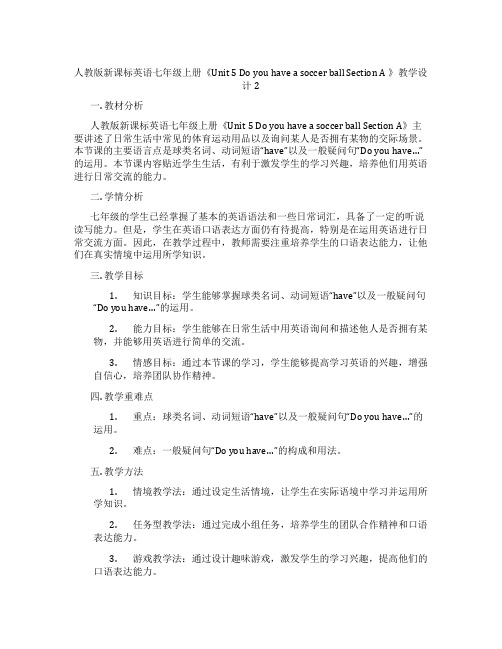
人教版新课标英语七年级上册《Unit 5 Do you have a soccer ball Section A 》教学设计2一. 教材分析人教版新课标英语七年级上册《Unit 5 Do you have a soccer ball Section A》主要讲述了日常生活中常见的体育运动用品以及询问某人是否拥有某物的交际场景。
本节课的主要语言点是球类名词、动词短语“have”以及一般疑问句“Do you have…”的运用。
本节课内容贴近学生生活,有利于激发学生的学习兴趣,培养他们用英语进行日常交流的能力。
二. 学情分析七年级的学生已经掌握了基本的英语语法和一些日常词汇,具备了一定的听说读写能力。
但是,学生在英语口语表达方面仍有待提高,特别是在运用英语进行日常交流方面。
因此,在教学过程中,教师需要注重培养学生的口语表达能力,让他们在真实情境中运用所学知识。
三. 教学目标1.知识目标:学生能够掌握球类名词、动词短语“have”以及一般疑问句“Do you have…”的运用。
2.能力目标:学生能够在日常生活中用英语询问和描述他人是否拥有某物,并能够用英语进行简单的交流。
3.情感目标:通过本节课的学习,学生能够提高学习英语的兴趣,增强自信心,培养团队协作精神。
四. 教学重难点1.重点:球类名词、动词短语“have”以及一般疑问句“Do you have…”的运用。
2.难点:一般疑问句“Do you have…”的构成和用法。
五. 教学方法1.情境教学法:通过设定生活情境,让学生在实际语境中学习并运用所学知识。
2.任务型教学法:通过完成小组任务,培养学生的团队合作精神和口语表达能力。
3.游戏教学法:通过设计趣味游戏,激发学生的学习兴趣,提高他们的口语表达能力。
六. 教学准备1.教师准备:提前准备好教学课件、球类图片、实物球类等教学资源。
2.学生准备:预习本节课内容,了解球类名词和动词短语“have”的用法。
人教版七年级上册英语Unit5Doyouhaveasoccerball
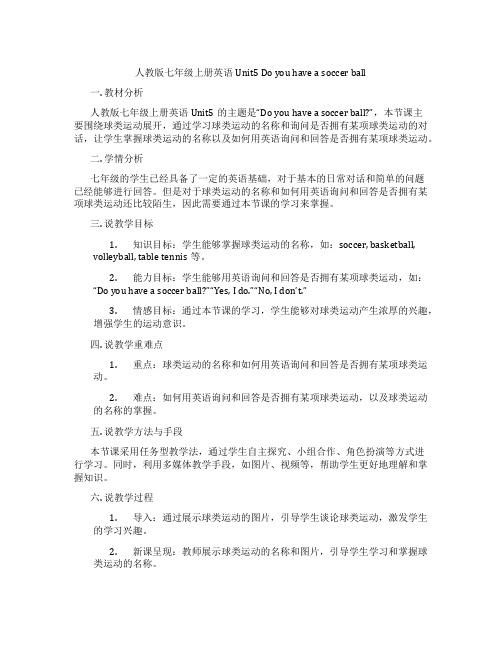
人教版七年级上册英语Unit5 Do you have a soccer ball一. 教材分析人教版七年级上册英语Unit5的主题是“Do you have a soccer ball?”,本节课主要围绕球类运动展开,通过学习球类运动的名称和询问是否拥有某项球类运动的对话,让学生掌握球类运动的名称以及如何用英语询问和回答是否拥有某项球类运动。
二. 学情分析七年级的学生已经具备了一定的英语基础,对于基本的日常对话和简单的问题已经能够进行回答。
但是对于球类运动的名称和如何用英语询问和回答是否拥有某项球类运动还比较陌生,因此需要通过本节课的学习来掌握。
三. 说教学目标1.知识目标:学生能够掌握球类运动的名称,如:soccer, basketball,volleyball, table tennis等。
2.能力目标:学生能够用英语询问和回答是否拥有某项球类运动,如:“Do you have a soccer ball?”“Yes, I do.”“No, I don’t.”3.情感目标:通过本节课的学习,学生能够对球类运动产生浓厚的兴趣,增强学生的运动意识。
四. 说教学重难点1.重点:球类运动的名称和如何用英语询问和回答是否拥有某项球类运动。
2.难点:如何用英语询问和回答是否拥有某项球类运动,以及球类运动的名称的掌握。
五. 说教学方法与手段本节课采用任务型教学法,通过学生自主探究、小组合作、角色扮演等方式进行学习。
同时,利用多媒体教学手段,如图片、视频等,帮助学生更好地理解和掌握知识。
六. 说教学过程1.导入:通过展示球类运动的图片,引导学生谈论球类运动,激发学生的学习兴趣。
2.新课呈现:教师展示球类运动的名称和图片,引导学生学习和掌握球类运动的名称。
3.对话练习:学生两人一组,模拟对话场景,练习如何用英语询问和回答是否拥有某项球类运动。
4.小组活动:学生分成小组,进行角色扮演,模拟真实场景,运用所学知识进行对话。
新人教版新目标七年级英语上册《U...

1 Unit5 Do you have a soccer ball?Period One (1a-1c)一.教材分析:通过uint4单元询问物品在哪的学习,过渡到本单元谈论物品的所属关系。
而本单元的核心语言项目是talk about ownership, 展开学习;以及围绕make suggestions 展开能力训练。
展开能力训练。
主要话题是主要话题是spending time with friends ,培养同学间团结、友爱的精神。
学会使用have 对物品的所属进行提问及回答,以掌握行为动词在一般现在时中的构成和使用;同时引导学生使用所学的句型谈论自己在球类运动中的喜好运动中的喜好,,以及谈论自己对某项运动的感受等。
本部分1a 中的主题图呈现了房间的情景,自然的将学生带入语言交流的自然环境中,引入了房间内常见物品的话题词汇和主要句型。
1a-1c 通过图文及听力练习导入整个单元的话题,是整个Section A 的基础.二.学情分析:本单元的主题是使用have 对物品的所属进行提问及回答,以掌握行为动词在一般现在时中的构成和使用;同时引导学生使用所学的句型谈论自己在球类运动中的喜好。
行为动词在一般现在时的肯定句、否定句和一般疑问句中的构成和使用是初中英语教学中非常重要的内容,七年级的学生经过小学的学习之后,已经具备了一定的英语语言功底,在思维能力方面有较强的记忆力和模仿力,但知识的扩展和运用能力有待于进一步提高,在认知心理方面,学生有较强的求知欲和表现欲。
并初步具备了合作探究能力。
三. Teaching Aims:1. Language goals:Key vocabulary: tennis, soccer, ball, volleyball, basketball, ping-pong2. Target language:----Do you have…? Do you have…?----Yes, I do. /No, I don’t.Yes, I do. /No, I don’t. 3. Ability goalsAsk and answer questions about the ownership.Train the students’ communicative competence and listening skill.4. Moral goalsDo sports every day and keep healthy.四.Teaching important points: 1. The words about ball.2. The target language.----Do you have…? Do you have…? ----Yes, I do. /No, I don’t.Yes, I do. /No, I don’t. ----Does she/he have…? Does she/he have…?----Yes, she/he does./No, she/ he doesn’t.Yes, she/he does./No, she/ he doesn’t. 五.Teaching difficult points:1. Have 与has 的使用的使用2. Do 与does 开头的一般疑问句开头的一般疑问句六.教法与学法:看图认读读单词法,模仿跟读、情境交际,合作交流等方法让学生掌握一些生活学习用品。
- 1、下载文档前请自行甄别文档内容的完整性,平台不提供额外的编辑、内容补充、找答案等附加服务。
- 2、"仅部分预览"的文档,不可在线预览部分如存在完整性等问题,可反馈申请退款(可完整预览的文档不适用该条件!)。
- 3、如文档侵犯您的权益,请联系客服反馈,我们会尽快为您处理(人工客服工作时间:9:00-18:30)。
3b Fill in the blanks in this magazine article about Sonia Hall.
Explanation
watch TV 看电视 television 常缩写成TV 2. Ed Smith has a great sports collection. 当主语为第三人称单数时, 动词have要变成 第三人称has。
Do you have a watch? 你有手表吗? 主语have是英语中很有用的动词,基本含义 是“有”。如课文中的I have a soccer ball. have 在he, she, it 后面要变成has。
即:一般现在时态第三人称单数形式。如: He has a basketball. Have 当动词“有”的意思时, 句式是: 陈述句:I have a nice bag. 疑问句:Do you have a nice bag? Yes, I do. No, I don’t. 否定句:I don’t have a nice bag.
Tapescript
A: Do you have a computer game? B: No, I don’t. A: Do you have a ping-pong bat? B: Yes, I do.
Explanation(1c:P25)
1. Do you have a ping-pong ball? 这是一个现在时行为动词(do) 的 一般疑问句,其中have 是实义动词, 表示“某人拥有”。句中do为助动词, 没有实际意义。只是帮助构成句 式。
have与其它的词组合成词组、短语,就不表 示 “有”了,其意思与后面的名词接近。如: have classes (上课) ; have breakfast (吃 早饭); have a good time (玩得高兴); have sports (进行体育活动); have a day off (休假)等等。
例如:many boys 许多男孩。
many girls许多女孩。
Section B
Listening(2a:P28)
interesting ____ 2.boring___ 3. fun___ 4.difficult___ 5.relaxing___
2. boring
3. fun
Tapescript
Conversation 2
A: Hi, Mike. B: Hi, Ed. A: I want to play basketball. Do you have a basketball? B: Yes, I do. A: Great!
PAIRWORK (2c:P26)
Samples
A: Do you have a basketball? B: Yes, I do. A: Do you have a pen? B: No, I don’t.
A: Let’s play computer games! B: That sounds interesting, but I don’t have a computer. A: Well, do you have a volleyball? B: Yes. A: Then let’s play volleyball. B: Oh, volleyball is so difficult…
3a:P27
Let’s
have
soccer
Explanation
1. soccer ball soccer ball 是指英式足球, 常用于口 语, 即通常所指的football。 American football 美式足球, 橄榄球。
2.Let’s play ping-pong.
句中的let’s 表示“让我们”,这个句
1.
例如:he has two sisters. 他有两个妹妹。 Mary has a computer game. 马丽有一个游戏机。
3.
But he doesn’t play sports. 主语为第三人称单数的一般现在时的否定句 式为: 主语+doesn’t+动词原形+其它。 例如:My mother doesn’t like dogs. 我妈妈不喜欢狗。 She doesn’t have a book. 她没有书。
3. I don’t have a ping-pong ball. 这是一个行为动词(do)的否定句, 其句式为:主语(第一、二人称及复数) +don’t+动词原形+其它。例如: I don’t play soccer. 我不踢足球。
4. Let’s play tennis. 在球类运动的名称前不用冠词。 例如: play volleyball 打排球 play basketball 打篮球 5.Well, let’s play volleyball. Well 为语气词, 表示说话人的语气, 翻 译为 “恩”。
2.
have与there be句型的区别: There be是表示“在某处存在某物”;而 have则是表示所属的意思,即“拥有”,通常 是人。我们来看两个句子: There is a book on the desk. 书桌上有一本书。 I have many books. 我有很多本书。
6. That sounds good. 句中的sound 为系动词,其后接形容 词good 作表语。 当主语是第三人称单数时, 在一般现在 时的肯定句中, 动词后要加s, 构成动词的 第三人称单数形式。
7.We have many sports clubs.
many 用来修饰可数名词的复数形
式, 意思是“许多”。
THANKS THANKS
THANKS
THANKS THANKS
5.
He only watches them on TV! them 为代词they的宾格形式,在句中做宾 语。 例如:I like them. 我喜欢他们。 Do you know them? 你认识他们吗?
watch TV 和watch …on TV的区别: watch TV 为固定搭配,意思为“看电视”。 watch …on TV是“在电视上看…”介词必 须用on。
型表示说话人的建议,建议说话人和听
话人一起去干某事情,它是let us 的缩
写形式,但用let us 表示的是说话人建
议听话人让说话人干某事。
例如:
Let’s go to school. 让我们到学校去。
Let’s play basketball. 让我们打篮球去。 Mr. Wang, let us read the book now. 王老师, 让我们读课文吧。
Thank you for listening!
THANKS
THANKS THANKS THANKS THANKS THANKS THANKS THANKS THANKS THANKS
THANKS
THANKS THANKS THANKS THANKS THANKS THANKS THANKS THANKS THANKS
Do you have a football?
பைடு நூலகம்
Section A
Guessing game! What are these!
tennis racket
Listening (1b:P25)
Ping-pong bat soccer ball Volleyball Computer game
A: OK, let’s watch TV. B: That sounds boring. Hmmm… Let’s play soccer! Do you have a soccer ball? A: No, I don’t. B: Oh. Well, do you have a basketball. A: Yes, I do. Let’s play basketball! B: That sounds fun!
THANKS
THANKS THANKS THANKS THANKS THANKS THANKS THANKS THANKS THANKS
THANKS
THANKS THANKS
THANKS
THANKS THANKS
THANKS
THANKS THANKS
THANKS
THANKS THANKS
THANKS
2. Yes, I do. 这是个肯定的简略回答形式。 其中do为动词, 用来避免动词的重复。 3. No. I don’t. 这是个否定的简略回答形式, 其中don’t是do和not的缩写形式。
Tapescript
A: Do you have a soccer ball, Peter? B: No, I don’t. A: Does your brother Alan have one? B: Yes, he does.
